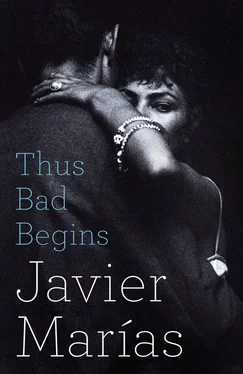I remembered then what he’d said to me on another morning, when he talked to me about their firstborn who had died and how much Van Vechten had done to save him, and how much he’d done for all of them over the years. Those were the words of someone who knows what the balance of probabilities is in people’s lives and who doesn’t consider himself to be an exception: ‘Far too many lives are shaped by deceit or error, it’s probably always been like that, so why should I be any different, why shouldn’t my life be the same? That thought gives me some consolation, convinces me that I’m not the only one — on the contrary, I’m just one more on an endless list of those who tried to act correctly, to keep their promises, those who prided themselves on being able to say something that sounds more and more like a piece of antiquated foolishness: “My word on it” …’
He took a sip of his drink, lit another of my cigarettes, and crossed his legs, so long that the foot of the upper leg easily touched the floor. He felt in one of his trouser pockets, took out his compass and brought needle to eye or eye to needle, as if the latter contained all of past time or all of time as yet unhappened, or as if he had grown tired of remembering and was leaving the rest for me to deduce. However, I asked:
‘Why didn’t you separate? Weren’t you tempted to just leave at once?’ I wanted to know why he had opted instead for that long and indissoluble misery. As I’ve mentioned, divorce didn’t exist in Spain then and wouldn’t be made legal until a year later, but from 1940 on, people used to separate discreetly, without making it official or telling anyone, especially if it was the husband who decided to leave. It had always been like that in subjugated Spain, with people finding ways of getting around the laws, or some of them.
‘Certainly not.’ He reacted at once, his one eye bright with anger, and looked up from his compass. ‘When she showed me the letter, I understood that the radiant smile with which she had greeted me when I went to meet her at the airport, the smile I’d tried to get actresses to emulate, was not one of mere unknowing happiness, blithely unaware of the risk she had run, but the knowing, triumphantly happy smile of someone who has got her own way and seen her performance crowned with success. She had to pay for that, and leaving her would have been too benign a thing to do. She would have recovered sooner or later, and since she was still fairly young, she might have met another man. However, if I was still around, even if only periodically, that would have been impossible. As has proved to be the case.’
‘She still is young, Eduardo, although you don’t want to see that.’
Either he didn’t hear me or he ignored me.
‘I insisted on having separate rooms and closed my door to her for ever. If nothing else, ours had always been a very sexual relationship. But I haven’t touched her since, not for … how old is Tomás now? … eight years. Nor have I gone back to loving her in that easy, celebratory, superficial way in which I always loved her, and which, for her, was enough.’ And yet I had on a few occasions seen them laughing together perhaps without realizing that they were; and after the Hotel Wellington incident, he’d behaved kindly and almost affectionately towards her: we can’t entirely suppress old habits, I suppose, however hard we try. ‘She put on weight, became depressed, began gradually to lose her mind, every day a little more. All her suicide attempts have occurred since then and are doubtless a consequence of that, or were to begin with. She would never even have considered suicide before, she had nothing to complain about. No, there was nothing benign about what I did, but it was just.’ — ‘Forgiveness doesn’t last as long as vengeance,’ I thought or recalled. Or perhaps I only think or recall that now.
‘Yes, but at the cost of staying bound to her. It reminds me of that expression that so perfectly defines us Spaniards: Quedarse uno tuerto por dejar al otro ciego — “To put out your own eye while trying to make another man blind.” ’
He looked at me with a mixture of severity and irony.
‘I was already one-eyed, young De Vere, or hadn’t you noticed?’ And he again tapped on his eyepatch. But this time he didn’t mean this only in the literal sense, he was referring to his own ingenuousness, his good faith, his credulity of twenty or so years ago. ‘Since then, I do as I want, I don’t have to account to anyone or to bother inventing truths. And it’s the same for her, I suppose, I don’t care how she conducts her life, I’ve washed my hands of her; but she does what she wants because she has to, not because she wants to; she does it reluctantly, I oblige her to enjoy a freedom she doesn’t want at all, because she would much prefer to be tied to me. Besides, I haven’t missed anything: I haven’t met anyone else who interested me enough to make me consider running off with her. That’s all over, out of the question. Although who knows, soon …’
‘Soon what?’ The words just slipped out, and my pushiness doubtless prevented me from finding out what he was about to announce, what tempting future beckoned.
‘Nothing.’ He clammed up at once. ‘Just as the past isn’t really any of your business, the future certainly isn’t.’
I didn’t insist, I prudently let it pass. ‘Just as well,’ I thought when I saw the recognizable oval face, the pink smudge behind the glass panes, she obviously didn’t care now if Muriel saw her or not, although he still had his back to her, while I was facing her. ‘It’s best if she doesn’t hear, assuming she can, it’s best if she doesn’t hear him, that poor unhappy woman, sad and affectionate. Poor soul, poor wretch.’
‘But you obviously do care how she conducts her life,’ I said, returning to what he had said earlier, ‘given how terrified you were on that night at the Hotel Wellington.’
‘Ha,’ he said. And after a few seconds, he made the same sound, not so much a laugh as a sign of faint disappointment or superiority: as if he needed to make himself superior to me. ‘Ha. So much for being the memory man. As you yourself said: I don’t care how she conducts her life, but I do care how she conducts her death and I don’t want her to succeed in that. I care a great deal about her dying, about her killing herself. That’s the last thing I want. It would be terrible for my children, and for me as well. Of course if she does succeed one day, there’s nothing I can do about it. But if that does happen, be in no doubt, it will be a real tragedy for me and I will weep for her. As I said, you can’t just put a line through the past to erase it. Even once you’ve decided that you no longer want that past.’
Yes, I had heard him say something along those lines, and he had put it more elaborately to Beatriz at the door to his bedroom: ‘What is the point of setting the record straight? That’s even worse, because it invalidates or gives the lie to everything that went before, it obliges the deceived person to look at their whole life in a new light, or else deny it. And yet that was your life, and you can’t unlive what you’ve lived. So what do you do? Strike out your whole existence? That’s impossible but neither can you simply discard all those years, which were what they were and can be no other way, and of which there will always be a remnant, a memory, even if it smacks of the phantasmagorical, something that both happened and didn’t happen. And what do you do with something that both happened and didn’t happen?’ His tone had been one of lamentation, not scornful or aggressive, although there was still perhaps a hint of rancour. Beatriz Noguera had immediately adopted that same tone, wishing she could turn back the clock and asking his forgiveness; perhaps knowingly, perhaps sincerely.
Читать дальше












